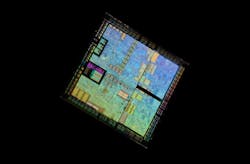Applied Materials Says Memory Chip Recovery Delayed to 2020
Applied Materials, the world's largest seller of chip production equipment, said that its profits had slumped more than 40% over the last quarter as the Santa Clara, California-based company feels the pain from a prolonged slowdown in the market for long-term storage and short-term memory. Applied Materials, which serves as a bellwether for the global chip business, warned that investment in memory chips would only start to turn around in 2020.
Sales slipped to $3.56 billion in the third quarter from $4.16 billion in the same quarter last year as pullbacks in spending on memory production outstripped strong sales to its customers in the made-to-order chip business, including TSMC and Globalfoundries. The results came out slightly ahead of analyst estimates of $3.52 billion even though many of its largest customers are facing slower demand for chips amid the escalating trade war between the U.S. and China.
Applied Materials is confronting "a market environment that remains challenging for the time being," chief executive officer Gary Dickerson said in a statement. Gross margins dropped from 44.8% to 43.7% over the last year, he said. Total profit fell to $571 million, or 61 cents per share, which represents a roughly 44% year-over-year decline from $1.02 billion, or $1.01 per share. Dickerson said that the global chip business would likely not recover before the end of 2019.
The Silicon Valley company sees sales declining in the fourth quarter of 2019 to between $3.535 billion to $3.835 billion, down from about $4.01 billion a year ago. But at the same time, Applied Materials is "fully funding our R&D programs to develop new products and capabilities that will accelerate customers' road maps and underpin our growth in the years ahead," Dickerson said, pointing out the promising future for memory chips based on MRAM and ReRAM.
Applied Materials expects earnings in the range of 72 cents per share to 80 cents per share.
Business had been booming for Applied Materials as customers raced to create more advanced chips for running artificial intelligence and tapping into 5G networks. But the demand for memory chips used in data centers, smartphones and other systems has declined sharply over the last year, flooding the market and forcing memory chip makers to set back spending and shut down production lines. The belt-tightening has been torture for Applied Materials.
Applied's NAND sales have declined from 39% to 24% of its overall business over the last year as memory manufacturers ranging from Micron Technology to Toshiba scramble to reduce spending and slash production amid lagging demand, which has hammered average selling prices (ASPs), which fluctuate based on global supply and demand. DRAM accounted for 29% of the company's total sales in the third quarter of 2019, up from 27% a year ago.
"Our semiconductor business continues to feel stable, and while I'm still not ready to call the bottom of the cycle yet, we see positive leading indicators of future growth," the company's chief financial officer Dan Durn said on an analyst conference call Thursday. "Looking ahead to 2020, we continue to expect growth across our markets and gradual U-shaped recovery." He told analysts that he is "not expecting to see a recovery in 2019. This is a 2020 event."
Applied Materials sees NAND spending starting to recover ahead of DRAM investments in 2020. The global market for chip production technology is projected to fall 15% to 20% in fiscal 2019, said Durn. Sales of NAND and DRAM accounted for 35% of the $475 billion semiconductor sector last year. "We see 2020 as more positive for Applied, with the start of a recovery in memory investment and sustained strength in foundry logic spending," Durn said.
Sales to foundry and logic customers accounted for about 49% of its overall sales over the last quarter, up from 36% a year ago. "Demand has strengthened as the year has progressed, as we see customers ramping up their leading-edge nodes," Durn said, referring to 10-nanometers and 7-nanometers. "Demand for specialty nodes that serve the IoT, communications, automotive, power and image sensor markets is also driving robust investments."
Revenue from repairing and supplying replacement parts for its installed base of fab equipment came close to a billion dollars. Applied Materials said its global services business slipped 2% over the last year from $952 million to $931 million, with more than $250 million in profit and gross margins of almost 28%. Durn said that he anticipates a record year for the global services business but he lowered its growth target to between 1% and 5% in fiscal 2019.
About the Author
James Morra
Senior Editor
James Morra is the senior editor for Electronic Design, covering the semiconductor industry and new technology trends, with a focus on power electronics and power management. He also reports on the business behind electrical engineering, including the electronics supply chain. He joined Electronic Design in 2015 and is based in Chicago, Illinois.

